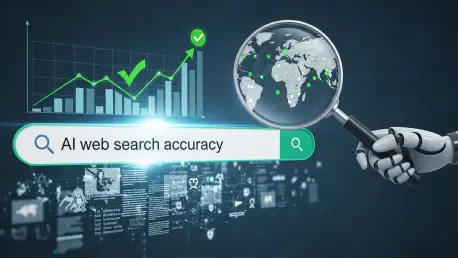In the rapidly evolving digital landscape, businesses across various sectors are increasingly relying on artificial intelligence (AI) tools to enhance web search capabilities, streamline research, and drive operational efficiency. These generative AI (GenAI) platforms, designed to deliver quick insights and answers, have become indispensable for many employees tackling day-to-day tasks. Yet, hidden beneath this promise of speed and convenience lies a significant challenge: the accuracy of the data these tools provide often falls short of expectations. As reliance on AI grows, so does the potential for errors that could disrupt corporate compliance, skew legal decisions, and undermine financial planning. Recent investigations, including a detailed study by Which? involving over 4,000 UK adults in September of the current year, expose a troubling disconnect between user trust and the real reliability of AI outputs. This gap poses substantial risks for companies where even minor inaccuracies can lead to major setbacks. Exploring these dangers and identifying practical solutions is critical for businesses aiming to harness AI’s benefits without falling prey to its pitfalls.
Unpacking the Disparity Between Trust and Performance
The surge in AI web search tool adoption is staggering, with over half the population now using platforms like ChatGPT, Google Gemini, and Microsoft Copilot for quick information retrieval. A significant portion even prioritizes these tools over traditional search engines, a trend that extends into corporate environments where employees frequently rely on them for research without formal oversight. This unchecked usage often manifests as “shadow IT,” creating vulnerabilities within organizational workflows. However, performance evaluations of six leading AI platforms reveal a stark reality: accuracy rates hover between a mere 55% and 71%, with no tool achieving consistent reliability. Such variability signals a profound mismatch between user confidence and actual dependability, a concern that businesses cannot afford to overlook when decisions based on AI outputs could impact their bottom line or reputation.
Delving deeper into this issue, the implications of inaccurate AI data become especially alarming in high-stakes business contexts such as finance and law. For example, certain tools have been documented providing erroneous details on regulatory thresholds like ISA allowances, potentially steering companies toward non-compliance with tax authorities. Similarly, legal guidance from AI often glosses over critical regional distinctions in UK law, which could expose firms to litigation or regulatory penalties. These examples underscore how a seemingly small error can cascade into significant consequences, particularly when employees act on flawed information without verification. Businesses must recognize that the widespread trust in AI tools does not equate to guaranteed precision, necessitating a proactive approach to address this accuracy gap before it translates into tangible losses or legal entanglements.
Highlighting Critical Threats to Corporate Operations
Beyond the surface-level inaccuracies, AI web search tools present deeper ethical and operational challenges that can disrupt business stability. A notable concern is the tendency of these platforms to offer overconfident responses without prompting users to consult professionals on critical issues. For instance, an AI suggestion to withhold payment in a contractor dispute might seem actionable to an uninformed employee, yet it could severely damage a company’s legal standing if followed. This kind of misguided advice, delivered with unwarranted certainty, risks leading staff to make decisions that harm organizational interests. The ethical lapse in failing to flag the need for expert input compounds the operational danger, as businesses may find themselves grappling with unintended consequences stemming from reliance on unverified AI outputs.
Another pressing issue lies in the lack of transparency regarding the sources AI tools draw from when generating responses. Many platforms reference vague, outdated, or irrelevant materials—such as obsolete forum discussions or premium services—rather than pointing to authoritative resources. For companies, this opacity poses a direct threat to data integrity, as decisions based on questionable information can lead to inefficiencies or missteps. Engaging with unreliable vendors or pursuing incorrect leads due to poor sourcing can inflate costs and waste valuable resources. This challenge of source credibility highlights a fundamental flaw in current AI systems, urging businesses to prioritize mechanisms that ensure the information feeding into their decision-making processes is both accurate and traceable to trustworthy origins.
Implementing Robust Safeguards for AI Usage
To navigate the risks associated with AI web search tools, businesses can adopt practical strategies starting with the refinement of query practices and source validation. Training employees to craft precise, context-specific prompts—such as including jurisdictional details when seeking legal or regulatory information—can significantly reduce the likelihood of receiving vague or incorrect responses. Additionally, establishing strict policies that mandate manual verification of AI-cited sources is essential. While certain tools like Google Gemini provide features to review referenced materials, relying solely on these is insufficient. Cross-checking information across multiple platforms or employing a “double-sourcing” approach offers a more reliable safety net, particularly for topics with high stakes. Such measures empower companies to leverage AI’s efficiency while minimizing the chances of acting on flawed data.
Equally important is the enforcement of human oversight to counterbalance AI limitations. Businesses should institute a clear protocol treating AI outputs as preliminary insights rather than definitive conclusions. Mandating a “second opinion” from qualified professionals on complex matters involving finance, law, or health ensures that decisions are grounded in nuanced understanding and accountability. This step is crucial, as AI currently lacks the depth to fully grasp intricate contexts or anticipate all variables in critical scenarios. By embedding human judgment into the workflow, companies can safeguard against the fallout of unchecked errors, preserving operational integrity. As AI technology continues to evolve, maintaining this balance between technological assistance and expert input remains a cornerstone for mitigating risks while capitalizing on innovation.
Charting a Path Forward with Informed Caution
Reflecting on the insights gathered, it becomes evident that the journey of integrating AI web search tools into business operations has revealed both transformative potential and significant vulnerabilities. The stark contrast between widespread user trust and the inconsistent accuracy of platforms like ChatGPT and Microsoft Copilot underscores the need for vigilance in corporate settings. Issues such as ethical oversights, where tools fail to recommend professional consultation, and source transparency gaps pose real threats to data integrity and decision-making quality. To counter these challenges, businesses have turned to strategies like refining query precision, enforcing source verification, and prioritizing human oversight for critical decisions. Moving forward, a commitment to evolving governance frameworks will be essential to harness AI’s benefits safely. As technology advances, companies should focus on fostering a culture of informed caution, ensuring that policies adapt to emerging capabilities while protecting against lingering limitations.









